In Indian cities from Delhi’s Mukherjee Nagar to Hyderabad’s Ashok Nagar, multistorey campuses rise like monuments to ambition. Advertisements hail “top mentors,” “star faculties,” and “nation-builders” shaping the future of India’s bureaucracy. Yet, for many critics, these UPSC coaching institutes are not temples of education but empires of profit. Their glossy façades hide a ruthless business model: selling dreams to millions while knowing that 99 percent of students will never succeed in clearing the Union Public Service Commission’s notoriously difficult exam.
Feeding on Hope and Failure
Inside cramped classrooms, aspirants are urged to sacrifice youth, relationships, and stability for “the struggle.” Coaching centers glorify drops, depression, and multiple failed attempts as badges of honor. Motivational speeches promise transformation, yet their true aim, critics say, is to keep students locked in an endless cycle of enrollment. The industry thrives not on success but on repetition: the more failures, the more fees. Behind the rhetoric of service, the reality is a churn of broken confidence, dwindling savings, and delayed lives.
The Human Cost of an Exam Obsession
For many in their thirties, years of chasing the civil services leave behind not prestigious government postings but unemployment, financial ruin, and résumés marred by “UPSC attempts.” Families invest life savings, students share dingy apartments, and anxiety disorders rise. “They don’t produce the nation’s future bureaucrats,” one critic observed, “but burnt-out youth, broken dreams, and delayed lives.” Even the 1 percent who clear the exam are often absorbed into the same corrupt system they once idealized.
Shared Responsibility and a Larger Ecosystem
The coaching centers are not alone in perpetuating the cycle. Aspirants themselves shoulder part of the burden. Despite knowing the success rate is less than 0.1 percent, many continue to reattempt without diversifying skills or pursuing alternate careers. Much like immigration consultants who profit regardless of visa approvals, UPSC academies gain whether students pass or fail. In both cases, the business flourishes while the individual bears the cost. Meanwhile, the self-styled “gurus” drive luxury cars and expand their empires, even as their students share cramped hostels, struggle with depression, and cling to hope.



